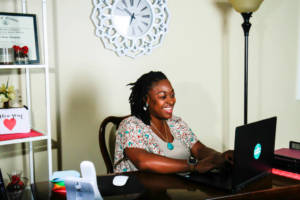 Telehealth isn’t a new innovation by any stretch of the matter. An article dating back to 1879 stressed the need for using the telephone to decrease in-person doctor visits. Nowadays you can send your doctor a picture from your smartphone and they’ll be able to not only diagnose your condition but also write a prescription. The same is happening for tele-mental health. Melissa Douglass, the owner of Goal-Driven Counseling, sits down with BlackDoctor to talk about tele-mental health.
Telehealth isn’t a new innovation by any stretch of the matter. An article dating back to 1879 stressed the need for using the telephone to decrease in-person doctor visits. Nowadays you can send your doctor a picture from your smartphone and they’ll be able to not only diagnose your condition but also write a prescription. The same is happening for tele-mental health. Melissa Douglass, the owner of Goal-Driven Counseling, sits down with BlackDoctor to talk about tele-mental health.
What is telehealth?
Telehealth is the general term used in the health profession where the provider and client are physically located in two separate locations using a HIPAA secure technological means to communicate. The methods of telecommunication include synchronous, real-time, options such as a telephone (audio-only) and video-conferencing; as well as asynchronous, store-and-forward, options such as email and text-based formats. Telehealth spans across disciplines including tele-medicine, tele-psychiatry, and tele-mental health. As a Licensed Clinical Social Worker and therapist, I will focus on the latter.
Tele-mental health is also referenced as online counseling, virtual therapy, e-counseling, and distance counseling. Research over the last 20+ years has shown tele-mental health to be just as effective as traditional, in-person, therapy. The largest difference is the responsibility of ensuring privacy and confidentiality is shifted to the client within their natural environment.
Why wouldn’t someone want to come to your office?
Seeking mental health support is still heavily stigmatized, which can make it difficult for individuals to physically come into a clinician’s office. Individuals who live with severe social anxieties and debilitating symptoms of major depressive disorder and PTSD may find tele-mental health services more accessible and comfortable than traditional face-to-face counseling.
Mental health clinicians and clients are embracing and utilizing distance counseling as it alleviates some past barriers to accessing services, including transportation concerns, geographic limitations, scheduling conflicts, andcontinuity of care due to personal factors.
Are the prices higher?
Tele-mental health sessions that utilize traditional scheduling, 45-60-minute audio or video-conference sessions, tend to be priced the same as in-person therapy. The clinician still utilizes their expertise to provide evidence-based interventions; while dedicated that specific time to the client.
Many insurance companies also cover the cost of tele-mental health sessions equivalent to what they would cover for traditional in-person services. The price varies from state to state and between insurance companies as well.
Are the people providing services just as licensed as the ones in office?
Whether online or in-person, clinicians are ethically and legally required to be trained, fully licensed, or under supervision, if provisionally licensed when providing psychotherapy services. Although it is not required by all states, it is best practice for clinicians to work within their scope of competence and receive specified training in telehealth when practicing online.
Describe a typical session
Before regular sessions begin, an initial consultation is conducted where I facilitate an Assessment of Fit to determine appropriateness for tele-mental health. In the first two sessions, I complete a full biopsychosocial assessment that ends with creating treatment goals with the client. A typical session after that always starts with a check-in.
At this time client reviews their previous week with me, specifically addressing what went well, what was challenging, and reviewing any experiences they feel would be beneficial in our work together. Next, we review any homework assignments from the previous week. In the larger part of the session, we typically use a mixture of treatment modalities to address the presenting concern. Lastly, we debrief, possibly do some grounding, and discuss any homework for the upcoming week.
Are there any treatments that require in-person diagnosis?
There are not any mental health conditions that cannot be diagnosed from a distance.
What services do you provide? Tell us about your business
I am the owner of Goal Driven Counseling, LLC, a 100% online tele-mental health private practice where I support teens and millennials through challenging education, career, and life transitions through secure video conferencing. I'm a Licensed Clinical Social Worker and Distance Credentialed Counselor who specializes in treating symptoms of depression, anxiety, chronic stress, and trauma.
I am strongly committed to providing community engagement and educational initiatives. I facilitate workshops and present at conferences on different mental health topics throughout the city of St. Louis for my “Taking the Wheel Series”. My personal mission is to fully utilize the merger of technology and quality mental health care to further reduce stigma and normalize the conversation of addressing mental health concerns.
Last question, what type of technology do your clients need to access these services?
When delivering services online it is ethical and best practice to use HIPAA secure platforms. HIPAA, the Health Insurance Accountability and Portability Act of 1996, is a federal regulation designed toprotect client’s personal health information that all medical professionals must abide by.
Standard SMS messaging, email (Gmail, Yahoo, Hotmail, etc), and video-conferencing options such as Facetime and Skype are not HIPAA secure options for telecommunications and tele-mental health. Approved options are encrypted and secured to a federal standard. For example, the platform I use for video-conferencing is a third party platform called We counsel; and there are several options such as Counsel, Thera-Link, Vsee, Doxy.me, etc.
My clients e-sign consent forms, participate in video calls, can securely message and live chat with me, and billing is also completed here. Before using Wecounel, they provided me with a Business Associate Agreement (BAA) that details their legal requirement and commitment to keep my client’s information safe and secure. We counsel has a mobile app and can be accessed through a smartphone, tablet, or web browser on a laptop or desktop computer.
*Disclaimer-I was not engaged in a live session on either of the photographs as it would have been a breach to my client’s privacy. They are used for simulation and promotional purposes only.
Daunte Henderson, founder of the MADEMAN Foundation, author, and educator based in Chicago. You can follow him at @brotherhenderson on IG










